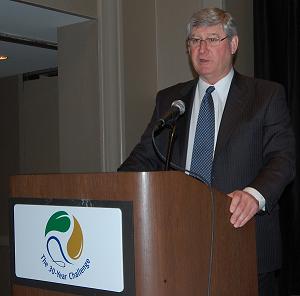 Rural America’s infrastructure challenges cut to the heart of the six challenges outlined during this morning’s session of the Farm Foundation’s Food and Agriculture Policy Summit being held in Washington, D.C.
Rural America’s infrastructure challenges cut to the heart of the six challenges outlined during this morning’s session of the Farm Foundation’s Food and Agriculture Policy Summit being held in Washington, D.C.
As you might have read on my earlier post over on AgWired.com, this morning, Farm Foundation Pres. Neil Conklin outlined the six major areas of challenges facing agriculture over the next 30 years: 1. Global financial markets and recession, 2. Global food security, 3. Global energy security, 4. Climate change, 5. Competition for natural resources, and 6. Global economic development. Gene Griffin with the Upper Great Plains Transportation Institute at North Dakota State University told the group attending today’s Farm Foundation session that a crumbling rural infrastructure, in particular, the roads, touches each one of these six challenges and threatens to make them even worse.
 “The engineers will tell you [the pavements] look OK on the surface, but underneath it is starting to crumble.” Griffin says by the time the damage is clearly noticeable, it costs two to three times as opposed to normal maintenance and repair.
“The engineers will tell you [the pavements] look OK on the surface, but underneath it is starting to crumble.” Griffin says by the time the damage is clearly noticeable, it costs two to three times as opposed to normal maintenance and repair.
“Just getting the political will of people to pay for systems they want to use… but they’ve gotten used to the idea they don’t necessarily have to pay for it. And I think those are two huge problems.”
Griffin says in his home state, where rural roads are seeing a huge amount of big trucks working the biodiesel and ethanol industries and North Dakota’s burgeoning petroleum industry is also taking a toll, that infrastructure needs the funding… although it might not see the same amount of traffic a higher-density population area would see. He says if the cities want the fuels that are produced in rural areas, we need to develop a system that links the high-density traffic areas with the low-density ones.
He says it comes down to deciding if we’re going to pay for the infrastructure that will help us be more energy independent now at a lower price or at a much higher price… down the road.
Listen to my entire conversation with Gene here: [audio:http://www.zimmcomm.biz/farm-foundation/Griffin1.mp3]
Download the audio here.
 GM-Holden will soon be offering its Commodore as E85 compatible in Australia. The group says that biofuels will become a leading alternative fuel for the company.
GM-Holden will soon be offering its Commodore as E85 compatible in Australia. The group says that biofuels will become a leading alternative fuel for the company.

 Rural America’s infrastructure challenges cut to the heart of the six challenges outlined during this morning’s session of the Farm Foundation’s Food and Agriculture Policy Summit being held in Washington, D.C.
Rural America’s infrastructure challenges cut to the heart of the six challenges outlined during this morning’s session of the Farm Foundation’s Food and Agriculture Policy Summit being held in Washington, D.C.  “The engineers will tell you [the pavements] look OK on the surface, but underneath it is starting to crumble.” Griffin says by the time the damage is clearly noticeable, it costs two to three times as opposed to normal maintenance and repair.
“The engineers will tell you [the pavements] look OK on the surface, but underneath it is starting to crumble.” Griffin says by the time the damage is clearly noticeable, it costs two to three times as opposed to normal maintenance and repair. The world’s population will grow by 33 percent by the year 2040, but the amount of farmland to feed and fuel that growing demand won’t have to grow by that same one-third… that’s what attendees at the Farm Foundation’s Food and Agriculture Policy Summit in Washington, D.C. heard this morning.
The world’s population will grow by 33 percent by the year 2040, but the amount of farmland to feed and fuel that growing demand won’t have to grow by that same one-third… that’s what attendees at the Farm Foundation’s Food and Agriculture Policy Summit in Washington, D.C. heard this morning. “Agriculture’s role is not one of conflict between food or fuel. It is one that is quite compatible. Producing more food results in more fuel being produced as well.”
“Agriculture’s role is not one of conflict between food or fuel. It is one that is quite compatible. Producing more food results in more fuel being produced as well.” General Motors’ Rick Wagoner (left) made the trip in a black hybrid Chevrolet Malibu, accompanied by a flex fuel Buick Lucerne, which runs on fuel that is 85 percent ethanol, and the high mileage Chevy Cobalt XFE. “Part of this is being done to showcase fuel-efficient and environment-friendly vehicles,” said GM spokesman Tom Wilkinson.
General Motors’ Rick Wagoner (left) made the trip in a black hybrid Chevrolet Malibu, accompanied by a flex fuel Buick Lucerne, which runs on fuel that is 85 percent ethanol, and the high mileage Chevy Cobalt XFE. “Part of this is being done to showcase fuel-efficient and environment-friendly vehicles,” said GM spokesman Tom Wilkinson. Ford’s Chief Executive Alan Mulally (center) traveled to the nation’s capital in a Ford Escape hybrid, which also runs on up to 85 percent ethanol. No word in the news reports what Robert Nardelli, chairman and chief executive of Chrysler, was driving.
Ford’s Chief Executive Alan Mulally (center) traveled to the nation’s capital in a Ford Escape hybrid, which also runs on up to 85 percent ethanol. No word in the news reports what Robert Nardelli, chairman and chief executive of Chrysler, was driving. The National Biodiesel Board is taking exception with a report that seems to equate unsustainable practices to produce biodiesel in some parts of the world with what American biodiesel producers are doing
The National Biodiesel Board is taking exception with a report that seems to equate unsustainable practices to produce biodiesel in some parts of the world with what American biodiesel producers are doing It was a pretty amazing event today at the Farm Foundation’s Food and Agriculture Policy Summit in Washington, D.C. today.
It was a pretty amazing event today at the Farm Foundation’s Food and Agriculture Policy Summit in Washington, D.C. today. A big part of this historic, bipartisan conversation was the role of biodiesel and ethanol, as well as other sources of renewable fuels.
A big part of this historic, bipartisan conversation was the role of biodiesel and ethanol, as well as other sources of renewable fuels.
 As expected, bankruptcy law and the ruling will allow VeraSun to reject any contracts that are economically disadvantageous to VeraSun, including corn growers’ contracts.
As expected, bankruptcy law and the ruling will allow VeraSun to reject any contracts that are economically disadvantageous to VeraSun, including corn growers’ contracts. The Minnesota Department of Agriculture has extended its deadline to apply for grants to help the state’s biodiesel industry.
The Minnesota Department of Agriculture has extended its deadline to apply for grants to help the state’s biodiesel industry. Moberly, Mo.-based Producers’ Choice Soy Energy LLC has received a $9.5 million construction loan from Advantage Capital Partners, a venture capital and small business finance firm. The loan was made possible through state and federal tax programs, including the Missouri New Markets Development program, that are designed to stimulate growth in underserved communities.
Moberly, Mo.-based Producers’ Choice Soy Energy LLC has received a $9.5 million construction loan from Advantage Capital Partners, a venture capital and small business finance firm. The loan was made possible through state and federal tax programs, including the Missouri New Markets Development program, that are designed to stimulate growth in underserved communities.